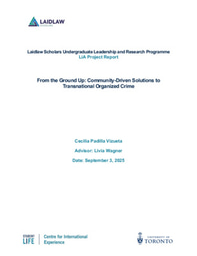Overview of Week 6
Week 6 concluded my LiA placement. I returned to the UN headquarters for a second round of negotiations on the Convention against Cybercrime, part of the lead‑up to the Hanoi Convention signing ceremony scheduled for October 2025. In parallel, I worked intensively to finalize my deliverables: the RPM guidance note, OSINT briefs on Belarus and Central Asia and the trafficking blog. I also prepared a 250‑word summary of the skills and experiences gained during the placement to guide me for Laidlaw's final deliverables.
What went well?
The final negotiations were very productive. GI‑TOC’s delegation highlighted the need for human‑rights safeguards in the cybercrime convention, further echoing concerns expressed by civil‑society organizations that the treaty extends beyond cybercrime and lacks adequate protections. Our advocacy eventually contributed to language in the final resolution calling for continued civil‑society engagement during the development of additional protocols. Additionally, I delivered the completed guidance note summarising RPM outcomes and identifying alignment with GI‑TOC’s priorities.
What could have gone differently?
Time pressure was intense. Balancing being present in the UN meetings with finalizing reports required careful time management, and I occasionally worked until late. In the future I will build more buffer into my schedule when multiple deadlines converge.
What did I learn about myself when working with others?
This week highlighted my growth in confidence and adaptability. I transitioned from feeling like an observer to actively contributing to multilateral discussions. Preparing to write Laidlaw's final report also allowed me to reflect on the skills acquired: (1) Negotiation and diplomacy where observing and supporting high‑level talks sharpened my ability to articulate positions and listen actively; (2) Cross‑cultural research and collaboration where working across teams and languages taught me to navigate diverse working styles; and (3) Open‑source intelligence and synthesis writing where gathering data from news reports, legal documents and interviews improved my analytical skills and ability to communicate clearly.
What did I learn about leadership?
Leadership requires resilience and a commitment to ethical principles. GI‑TOC’s strategy stresses the importance of making civil‑society voices heard, and I saw how patient, values‑driven advocacy can influence international outcomes. I also learned that leaders must always care for themselves to sustain their impact as effective work requires balancing workload with rest.
What do I want to develop or focus on next?
As my placement ends, I am grateful for the trust and mentorship offered by GI‑TOC. The experience has deepened my understanding of organized crime, multilateralism and leadership. I hope to continue engaging with these issues in future academic and professional endeavours.

Please sign in
If you are a registered user on Laidlaw Scholars Network, please sign in